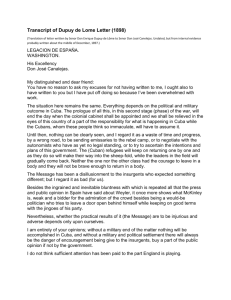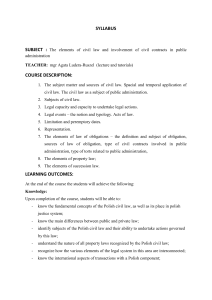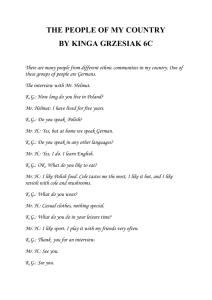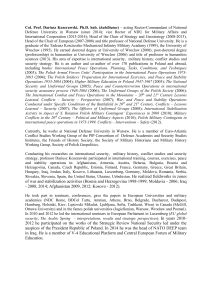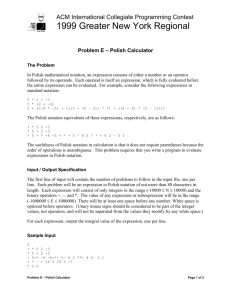Closing conference handouts are prepared by co
advertisement
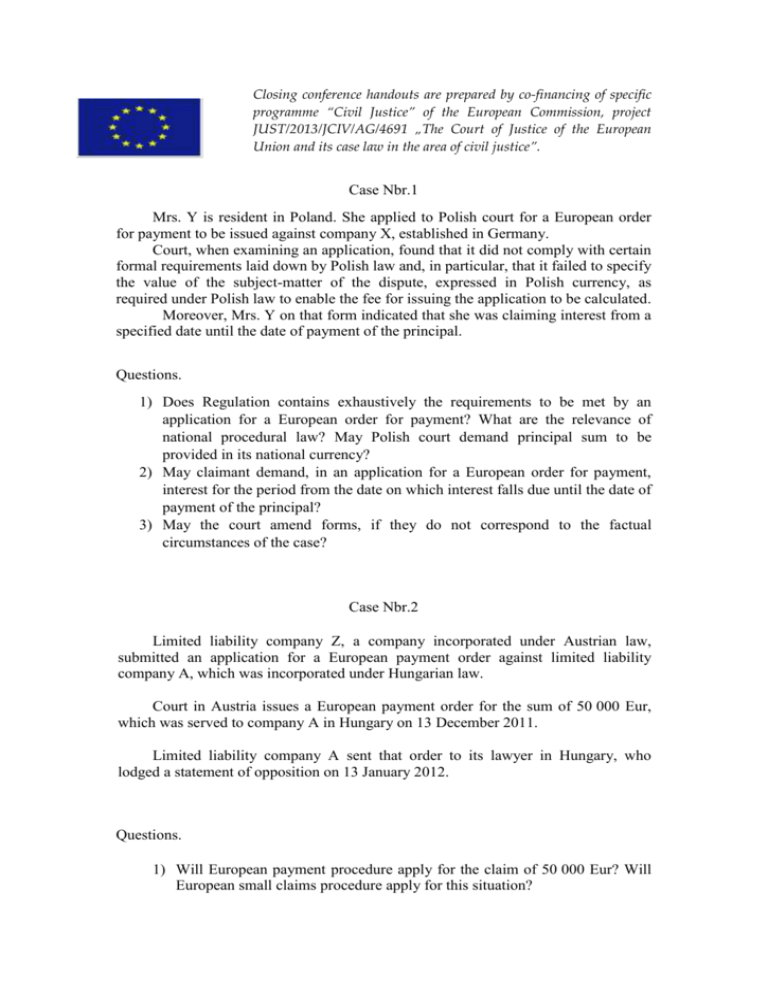
Closing conference handouts are prepared by co-financing of specific programme “Civil Justice” of the European Commission, project JUST/2013/JCIV/AG/4691 „The Court of Justice of the European Union and its case law in the area of civil justice”. Case Nbr.1 Mrs. Y is resident in Poland. She applied to Polish court for a European order for payment to be issued against company X, established in Germany. Court, when examining an application, found that it did not comply with certain formal requirements laid down by Polish law and, in particular, that it failed to specify the value of the subject-matter of the dispute, expressed in Polish currency, as required under Polish law to enable the fee for issuing the application to be calculated. Moreover, Mrs. Y on that form indicated that she was claiming interest from a specified date until the date of payment of the principal. Questions. 1) Does Regulation contains exhaustively the requirements to be met by an application for a European order for payment? What are the relevance of national procedural law? May Polish court demand principal sum to be provided in its national currency? 2) May claimant demand, in an application for a European order for payment, interest for the period from the date on which interest falls due until the date of payment of the principal? 3) May the court amend forms, if they do not correspond to the factual circumstances of the case? Case Nbr.2 Limited liability company Z, a company incorporated under Austrian law, submitted an application for a European payment order against limited liability company A, which was incorporated under Hungarian law. Court in Austria issues a European payment order for the sum of 50 000 Eur, which was served to company A in Hungary on 13 December 2011. Limited liability company A sent that order to its lawyer in Hungary, who lodged a statement of opposition on 13 January 2012. Questions. 1) Will European payment procedure apply for the claim of 50 000 Eur? Will European small claims procedure apply for this situation? 2) What is a legal regime applicable to the calculation of time limits? Have objections to the European payment order submitted on time? 3) If company’s attorney has missed the deadline for submitting objections, may the claimant ask to review already issued European order for payment? Case Nbr.3 Eco cosmetics, a company incorporated under German law, requested the referring court to issue a European order for payment against Ms Dupuy, who is domiciled in France. German court upheld the application and issued the European order for payment. The order was subsequently served by registered letter with advice of receipt. The advice of receipt shows that that order was served on 31 March 2010 at the address provided by eco cosmetics. The advice of receipt does not contain any other information about service of the order. On 20 May 2010, the referring court declared that order to be enforceable. By lawyer’s letter of 28 July 2010, Ms Dupuy challenged the order for payment concerned. By letter of 5 August 2010, the referring court indicated that the opposition was out of time and that, at that stage, it was possible only to apply for a review in accordance with Article 20 of Regulation No 1896/2006. Two months later, by letter of 7 October 2010, Ms Dupuy lodged an application for a review. Ms Dupuy claimed that she had not been served with the European order for payment issued against her. She states that she moved out of the premises at the address given by eco cosmetics in October 2009 and that she learned of the order for payment only through her bank on 23 July 2010. 1) What methods of service of documents can be used? Was service of documents in this case done properly? Which service method was used? 2) Can defendant ask for a review of European order for payment, if it has not been served on him properly?

